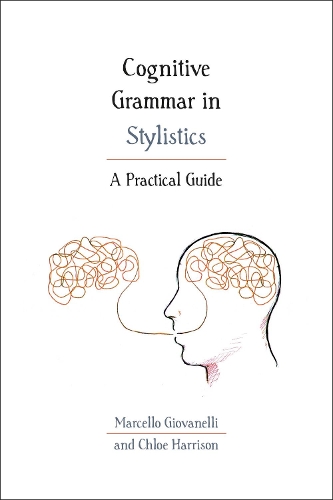
Cognitive Grammar in Stylistics: A Practical Guide
(Hardback)
Available Formats
Hardback
Published: 6th September 2018
Hardback, 2nd edition
Published: 17th October 2024
Paperback, 2nd edition
Published: 17th October 2024
Publishing Details
Cognitive Grammar in Stylistics: A Practical Guide
By (Author) Dr Marcello Giovanelli
By (author) Dr Chloe Harrison
Bloomsbury Publishing PLC
Bloomsbury Academic
6th September 2018
United Kingdom
Classifications
Tertiary Education
Non Fiction
428
Physical Properties
Hardback
208
Width 156mm, Height 234mm
472g
Description
Cognitive Grammar in Stylistics: A Practical Guide provides an engaging, accessible and practically-focused introduction to cognitive grammar outlining how central principles of the field can be used in stylistic analyses. Assuming no prior knowledge, the book leads students through the basics of cognitive grammar, outlining its place within the field of cognitive linguistics as a whole, providing clear explanations of key principles and concepts. It then explains how these can be used to study a range of literary and non-literary texts. The book argues that cognitive grammar offers a powerful alternative to more traditional grammatical models when analysing texts. Its primary focus is on the practical application of cognitive grammar to examples of language in context and on its potential for both literary and non-literary material. It offers a clear and facilitating approach to allow students to describe language features carefully and to explore how these descriptions can be developed into full and rich analyses. Suitable for undergraduate students taking modules in stylistics, English language, and cognitive linguistics, as well as postgraduates encountering the field for the first time, the book provides a much-needed and essential guide to this exciting subject.
Reviews
The book does what it says on the tin: it is an excellent introduction and practical guide for anyone interested in stylistic analysis, either professionally or academically ... Provides an introductory guide that is so engaging and clear that it may incite interested readers to dive into the more detailed and challenging original account of the framework. I was one of those readers; what about you * Babel: The Language Magazine *
The book is characterized by systematic application of cognitive grammar to stylistics from lexical, to clausal and finally to discourse level on the one hand, and abundant exemplary analyses on the other hand. So it is indeed a practical guide and pedagogically valuable. Equally importantly, it analyzes not only relatively traditional literary texts, but also contemporary genres, such as multimodal texts and experimental texts. * Journal of Literary Semantics *
An accessible overview of the framework of Cognitive Grammar which leads students comprehensively through the key principles in the field, and offers close guidance on the application of Cognitive Grammar to an impressive range of texts. * Language and Literature *
I was consistently surprised at the clarity the book brought to concepts that I have found challenging in my teaching for many years ... Giovanelli and Harrison have produced a remarkable book ... The book can be taken up in any context where grammar is taught because of its power to make grammar and language analysis fun, interesting, and, above all, explanatory. * JALT Journal *
This is a hugely empowering and enabling book. Cognitive Grammar is the latest exciting tool for stylistic exploration; Giovanelli and Harrison make it usable for a rich range of texts from literary works to politics, news and advertising. This book shows how a new way of thinking about language can seem the most natural way of analysing texts. * Peter Stockwell, Professor of Literary Linguistics, University of Nottingham, UK *
In Cognitive Grammar in Stylistics, Marcello Giovanelli and Chloe Harrison achieve an impressive feat: they introduce the notoriously difficult, unwieldy framework of cognitive grammar in a way that is engaging, and, above all, renew it as an accessible, usable stylistic tool. With activities, sample answers and suggestions for further reading and research, this book should be the first call for all students, teachers and scholars wanting to explore the various construals and force dynamics of poetry, drama, and fiction. * Alison Gibbons, Reader in Contemporary Stylistics, Sheffield Hallam University, UK *
This is a very engaging and highly accessible introduction both to cognitive grammar and to stylistics. It discusses a wide range of ideas from cognitive grammar and a wide range of texts. It clearly shows how the ideas from cognitive grammar help us to understand the texts and how analysing the texts helps us to understand cognitive grammar. It also makes clear how to analyse other texts independently. It is sure to be an influential publication, making it easier to introduce and explore ideas from cognitive grammar and stylistics in classroom work and in other activities. Students should find that it helps them to develop their understanding quickly and to move on to carry out their own research and other projects. I learned a lot from reading it. * Billy Clark, Professor of English Language and Linguistics, Northumbria University, UK *
[T]he textbook is a valuable source for any student of linguistics who begins her/his journey into the domain of Cognitive Grammar as used for the purposes of stylistic analysis. As such, it does fulfil its pedagogical function well. In addition to reader-friendly, coherent presentation of the theory, the book may provide the teacher with convenient, ready-made tasks, based on popular texts ... the inspirational role of Cognitive Grammar in Stylistics must be appreciated. * LaMiCuS *
This book expands the scope of application of Cognitive Grammar, and deepens the study of Cognitive Stylistics to more complex human cognition. It is undoubtedly a masterpiece brought by the combination of Cognitive Grammar and Stylistics. * Cognitive Linguistic Studies *
Author Bio
Chloe Harrison is a Lecturer in English Literature at Aston University, UK. Marcello Giovanelli is Senior Lecturer in English Literature and Co-Director at the Centre for the Critical Inquiry into Society and Culture (CCISC) at Aston University, UK.
